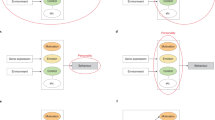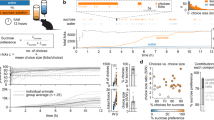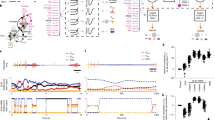Abstract
THERE have been three sets of discoveries on the effects of chemical substances on behaviour. First, it has been shown that chemical agents, especially endocrine hormones, can predispose animals to display particular species-typical (“instinctive”) actions such as mating, nest building and care of the young1,2. Second, it has been found that generalized stimulating, anti-depressant, tranquillizing or psychotomimetic effects on behaviour can be produced by certain chemical agents sometimes referred to as “psychotropic” drugs3. Third, it has been established that a response learned in a given chemical state is more likely to occur when the subject is in that particular state than when he is not; this phenomenon is called state-dependent learning or “drug dissociation”4. Only the third discovery indicates that it may be possible to obtain specific or discriminative chemical control over any chosen response through learning. It provides a means for understanding how the specific idiosyncratic response patterns comprising “personality” could come under chemical control.
This is a preview of subscription content, access via your institution
Access options
Subscribe to this journal
Receive 51 print issues and online access
$199.00 per year
only $3.90 per issue
Buy this article
- Purchase on Springer Link
- Instant access to full article PDF
Prices may be subject to local taxes which are calculated during checkout
Similar content being viewed by others
References
Beach, F. A., Hormones and Behavior (Hoeber, New York, 1948).
Lehrman, D. S., in Sex and Internal Secretions (edit. by Young W. C.) (Williams and Wilkins, Baltimore, 1961).
Uhr, L., and Miller, J. G., Drugs and Behavior (Wiley, New York, 1960).
Overton, D. A., Psychopharmacologia, 10, 6 (1966).
Girden, E., and Culler, E., J. Comp. Psychol., 23, 261 (1937).
Girden, E., J. Exp. Psychol., 31, 219 (1942).
Girden, E., J. Exp. Psychol., 31, 322 (1942).
Barry, H., Koepfer, E., and Lutch, J., Psychol. Rep., 16, 1072 (1965).
Bindra, D., and Reichert, H., Psychopharmacologia, 10, 330 (1967).
Otis, L. S., Science, 143, 1347 (1964).
Overton, D. A., J. Comp. Physiol. Psychol., 57, 3 (1964).
Sachs, E., Weingarten, M., and Klein, N. W., Psychopharmacologia, 9, 17 (1966).
Stewart, J., Psychopharmacologia, 3, 132 (1962).
Selye, H., Proc. Soc. Exp. Biol. and Med., 46, 116 (1941).
Laubach, G. D., P'An, S. Y., and Rudel, H. W., Science, 122, 78 (1955).
Author information
Authors and Affiliations
Rights and permissions
About this article
Cite this article
STEWART, J., KREBS, W. & KACZENDER, E. State-dependent Learning produced with Steroids. Nature 216, 1223–1224 (1967). https://doi.org/10.1038/2161223a0
Received:
Published:
Issue Date:
DOI: https://doi.org/10.1038/2161223a0
Comments
By submitting a comment you agree to abide by our Terms and Community Guidelines. If you find something abusive or that does not comply with our terms or guidelines please flag it as inappropriate.



